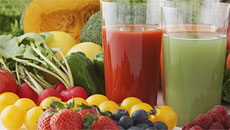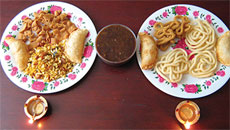Making food to satisfy the masses seems to be getting harder these days. Between detoxes and diets, going gluten-free and becoming vegan, knowing what to serve to your dinner guests can be a guessing game.
But what does it all mean and is it right for you? You’ve heard of juicing and you want to start drinking your dinners? You’re curious about eating paleo so you’re ready to toss out all your treats? Before you start cutting out carbs or only eating greens, understanding what choices are healthy and what choices are just hype will go a long way to leading a healthy lifestyle.
VEGAN
Veganism is a growing movement. As processed foods dominate the shelves, documentaries like Food Inc. and Supersize Me force consumers to rethink their food choices, and it’s no surprise that more and more people are adopting a vegan lifestyle. An increase in publicized information has made diners more aware, and subsequently, more concerned with their own health and that of the animals that are our source of sustenance.
While the first thing that comes to mind might be salads, becoming a vegetarian or a vegan is less about the greens that are eaten and more about the meats that are not.
While vegetarians opt not to eat meat, vegans eliminate all animal products from their diet. This includes avoiding eggs, dairy and other animal-derived products such as leathers, furs, wools and products tested on animals.

The reasons for going vegan are plenty and vary from religious reasons, health concerns, environmental awareness or the aim for a cruelty-free lifestyle. From a health perspective, it is believed that the consumption of animal fats contributes to heart disease, cancers, osteoporosis, diabetes and other chronic conditions and, therefore, the elimination of such proteins decreases the risk of illness. A healthy vegan diet is often low in fat and high in fibre.
Unfortunately, vegan and vegetarian diets quite often result in vitamin, mineral and nutrient deficiencies. This is not simply because one chooses to eat vegan but instead because the elimination of any animal products are not replaced with foods that contain the required nutrients. Adopting a vegan or vegetarian diet requires research, proper planning and an understanding of the food that you are choosing to eat to ensure that a balanced diet full of vitamins and minerals is still achieved.
With the rise in popularity of the vegan diet, it’s important to understand your reason for making such dietary choices. Choosing a wide variety of foods, monitoring your caloric intake to maintain your energy and being aware of your calcium, iron and vitamins D and B-12 levels will ensure that becoming vegan is a safe lifestyle and not just a bad habit.
GLUTEN-FREE
Thanks to several celebrities, going ‘gluten-free’ is gaining in popularity. But what is gluten and why would one want to be free of it?
Gluten is a protein found in foods that are processed from wheat and other related grains. It is what remains when the flour of such grains is washed to remove the starch. As its name suggests, it is a glue-like substance that provides the elasticity to dough, which helps it rise and often leads to a chewy texture.
This means that a gluten-free diet would require the elimination of any and all foods, beverages, condiments and sauces that could contain gluten. While it may seem like eliminating grains would be the easy way to avoid gluten, it is found in a variety of foods other than the obvious carbs, making it a difficult diet to follow. Gluten can be found in products such as cheese sauces, deli meats, canned soups, cooking sprays and herbal teas. Going gluten-free requires reading labels, asking questions and being educated.

Despite what celebrities or athletes might say, a gluten-free diet is only necessary for those diagnosed with celiac disease or gluten sensitivity. According to the Canadian Celiac Association, celiac disease is “a medical condition in which the absorptive surface of the small intestine is damaged by…gluten. This results in an inability of the body to absorb nutrients: protein, fat, carbohydrates, vitamins and minerals, which are necessary for good health.”
Not to be taken lightly, it is estimated that nearly 1 in every 133 people are affected by the disease that can cause serious health problems if not diagnosed and treated.
When it comes to picking the gluten-free option at your next dinner out, you may want to think twice about why you are selecting such a dish. While many restaurants now offer gluten-free menu options, making it much easier for those with celiac disease to eat out, it doesn’t mean it is the healthiest choice if you don’t have the medical need to avoid the protein.
“Depending on a person’s food choices, the gluten-free diet can in fact be less healthy than a regular diet,” says Mark Johnson, national secretary on the Board of Directors of the Canadian Celiac Association. “Compared to gluten-containing foods, the gluten-free baked goods that are available on the market, in general, have more calories, more fat and more salt, and are lower in fibre and several important vitamins. Contrary to rumour, many people who go gluten-free actually gain weight for these reasons. Gluten-free is not a diet to lose weight.”
That’s not to say that gluten-free dishes are unhealthy or should be avoided. “Avoiding gluten means cutting out most processed foods,” says Johnson. He points out that the gluten-free choice is often the healthier choices because it means choosing a piece of fruit over a piece of cake out of necessity. “Those with celiac disease tend to eat more ‘from scratch’ because so many processed foods contain gluten.”
If you’re looking to lose weight, going gluten-free is not the answer. Adopting certain mentalities that are required by those who are gluten-averse, like avoiding processed foods, is not a bad choice but a gluten-free diet does not mean a healthy diet. Just because everyone around you is going gluten-free these days, doesn’t mean you have to.
THE PALEO DIET
As the name suggests, The Paleo Diet is a reference to the Paleolithic era in history, a time when societies depended on hunting, fishing and gathering plants as their sources of food. While modern day conveniences have changed the way in which we gather, prepare and eat our foods, it is believed that when it comes to our diet, the people of the Paleolithic times were doing something right.
Mimicking the diet of our ancestors, The Paleo Diet includes fresh fruits and vegetables, meats and seafood, eggs, nuts and healthy oils. These foods are all considered high in nutrients and consequently encourage other food groups to be replaced with products that are more nutritious.
“The best science of the 21st century is now corroborating the notion that when we ditch the mainstays of our modern diet – refined sugars, grains, vegetable oils, dairy, salt and processed foods, which by the way, comprise approximately 70 per cent of the calories in the typical US diet – and replace these items with real foods, we flourish, lose weight, reduce or eliminate chronic disease and feel better,” says Loren Cordain, Ph.D., the world’s leading expert on Paleolithic diets and founder of the Paleo movement.
The list of benefits is long. Studies have found that The Paleo Diet clears up acne, improves asthma symptoms, decreases inflammation, increases energy levels and decreases the need for medications, on top of weight loss, improved moods and eliminating diseases. While individual results may vary, the growing number of success stories is a testament to the movement and the lives that have been changed from changes in food consumption.
Conversely, there are no known health risks related to adopting The Paleo Diet. “People increasingly realize the old adage that you are what you eat,” says Dr. Cordain. “A breakfast of soda pop, donuts, cereal and white bread makes us all feel crappy. Replace this mess for a few days with cage free eggs and a bowl of fresh fruit and see how you feel.”
And how you feel seems to be one of the biggest benefits that has people hooked on the Paleo way of eating. This proven benefit that continues to be supported by scientific research will likely see The Paleo Diet on more menus in the near future, confirming that it is not a food fad but a movement towards lifelong healthier eating.
JUICE CLEANSES
You’ve spent several hundred dollars on the fanciest juicer on the market. You’ve stocked up on your greens, your fridge is full of fruits and vegetables and you’ve looked up an abundance of delicious juice recipes. But will it help you get healthy? Juicing and juice cleanses are hot in the world of health right now. They taste good, contain good-for-you ingredients and satisfy the need for a fresh start. But what do they mean for your health?

A juice cleanse is a detox diet that involves the consumption of only freshly pressed fruit and vegetable juices in place of any other foods for anywhere from several days to several weeks. Cleanses are most often completed to aid in weight loss or break bad habits.
For many, it is seen as an easy fix – consuming your calories in the form of a liquid, especially after an indulgent vacation or food-filled holiday, provides the mental confirmation that you’ve just filled up with a healthy meal without chowing down.
Instead of depriving your body of food in an attempt to detox, cleanses offer a healthier alternative that adds a surplus of nutrients and avoids any toxins.
A juice cleanse may not be an easy fix when it comes to a complete lifestyle change, but it is touted as an easy way to press reset and bring your body back to a healthy starting point. Juice cleanses are designed to give your body a break from the daily wear and tear that they are so often subjected to when we eat out, eat on the run or eat too many treats when we know we shouldn’t.
You may be ready to drink your way into a detox but cleanses are not without controversy.
The lack of meat or diary in a juice cleanse may seem concerning to some. Cleanses are often questioned due to their lack of ‘real’ food and a possible deficiency in fibre, sodium and other essential nutrients. If done correctly, and only occasionally, a cleanse may still contain just what your body needs. The variety of ingredients and carefully formulated concoctions can provide a substantial list of vitamins and minerals without unhealthy fillers.
The business of fresh juices brings in billions of dollars proving just how popular it has become. But are there dangers associated with these detox diets? According to some experts, the risks related to a cleanse may not outweigh the proposed benefits.
While statistics have not yet been complied, cleanses are seen as segues to eating disorders. The idea of binge eating without consequence because a cleanse provides a clean slate can become addicting. Trying the odd cleanse may provide the perfect pick-me-up, but participants run the risk of overdosing on juices and depriving their body of its much needed nutrients. Dieticians have witnessed many cases of cleanse-induced weight loss that became addicting and developed into a disorder.
It is best to consult with your health care provider before beginning a cleanse as you may not realize the risks. If you decide that a cleanse is right for you and your body is ready to be reset in a healthy and delicious way, there are many local options for carefully crafted cleanses. When it comes to juicing, a little research can go a long way.
CONCLUSION
Celebrities, media and the mainstream masses continue to put pressure on having the perfect body, eating the healthiest foods and keeping up with what is popular. Without the knowledge to know the difference, changing your dietary needs might make you feel trendy but it might not be the healthiest choice. Proper planning when it comes to food will help you discover what your body needs, what it doesn’t and how to avoid the hype when it comes to your health.
BY ASHLEY STEPHENS






